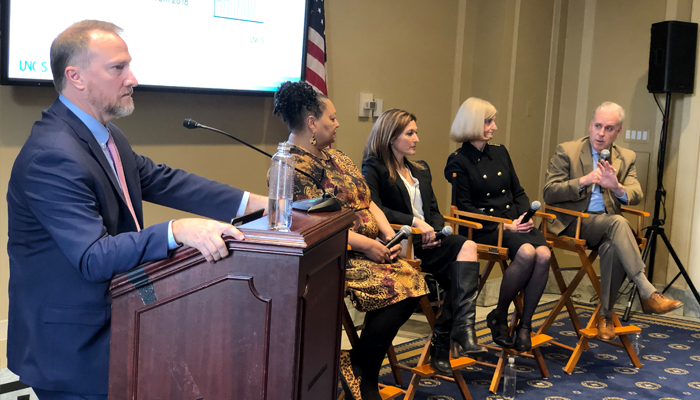At the invitation of the Congressional Organ and Tissue Donation and Transplantation Awareness Caucus, United Network for Organ Sharing representatives presented a briefing on Capitol Hill on Jan. 29. Attendees discussed key issues affecting the nation’s transplant system, such as developing equitable policies to help reduce waitlist mortality, measuring organ procurement organization, or OPO, and transplant hospital system performance, and collaborating on projects to increase organ donation and usage nationwide. More than 70 people attended the event, including congressional staff members and representatives from organ donation and transplant organizations.
At the start of the briefing, caucus co-chair Rep. Jim Costa welcomed participants and encouraged legislators to work together to build on the success of the transplant system and create greater opportunities for organ and tissue donation.
UNOS CEO Brian Shepard then provided an overview of the national transplant system structure and UNOS’ roles and responsibilities. He also facilitated a panel discussion that included UNOS Board of Directors representatives:
- Maryl Johnson, M.D., transplant cardiologist at University of Wisconsin Hospital and Clinics and UNOS Board of Directors president.
- Matthew Cooper, M.D., director of kidney and pancreas transplantation at MedStar Georgetown Transplant Institute.
- Alexandra Glazier, J.D., president and CEO of New England Donor Services.
- Valinda Jones, kidney transplant recipient and independent consultant for transplant administration, transplant quality and regulatory affairs.
During the briefing Johnson described the policy development process, which includes convening debate and collecting broad opinion about proposals, as well as making decisions for the benefit of all patients and the system as a whole. “The transplant communities have the same goals,” she said. “We want a transplant for everybody who is in need.”
Panel participants addressed issues, questions and misconceptions about the donation and transplantation process. For example, Glazier discussed the importance of organ donors and talked about how OPOs honor the gifts of life that the donors provide. “There can be no transplantation without donors,” she said. “We need community participation in donation to make organs available to transplant patients who will benefit, and that’s really one of the most unique aspects of all of this.” Glazier added that OPOs are tasked with making the connection “among the community and the donors, the donor hospitals, and ultimately then getting the organs to the right patients.”
The panel also discussed current challenges and future directions for systemwide organ donation and transplant improvement. Topics of discussion included improvements to the monitoring and oversight of donation and transplantation, and innovations to help organ donation and transplantation professionals place organs more efficiently and maximize the number of transplants performed.
Cooper, who chaired an ad hoc Organ Procurement and Transplantation Network committee of more than 60 OPO and transplant hospital professionals who studied ways to improve the national transplant system, reflected on improvements he look forward to seeing result of future collaborations. “I would rather look at a systems metric that says ‘success of transplant’ is the success of OPOs and transplant programs working together, not just an OPO doing this and a transplant program doing that,” he said. “It all requires cooperation.”
Learn more about the nation’s organ transplant system.

